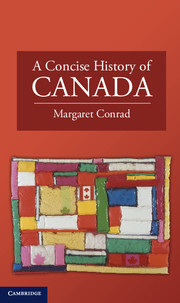Book contents
- Frontmatter
- Contents
- Illustrations
- Acknowledgements
- Introduction A Cautious Country
- 1 Since Time Immemorial
- 2 Natives and Newcomers, 1000–1661
- 3 New France, 1661–1763
- 4 A Revolutionary Age, 1763–1821
- 5 Transatlantic Communities, 1815–1849
- 6 Coming Together, 1849–1885
- 7 Making Progress, 1885–1914
- 8 Hanging On, 1914–1945
- 9 Liberalism Triumphant, 1945–1984
- 10 Interesting Times, 1984–2011
- Notes
- Guide to Further Reading
- Index
9 - Liberalism Triumphant, 1945–1984
Published online by Cambridge University Press: 05 June 2012
- Frontmatter
- Contents
- Illustrations
- Acknowledgements
- Introduction A Cautious Country
- 1 Since Time Immemorial
- 2 Natives and Newcomers, 1000–1661
- 3 New France, 1661–1763
- 4 A Revolutionary Age, 1763–1821
- 5 Transatlantic Communities, 1815–1849
- 6 Coming Together, 1849–1885
- 7 Making Progress, 1885–1914
- 8 Hanging On, 1914–1945
- 9 Liberalism Triumphant, 1945–1984
- 10 Interesting Times, 1984–2011
- Notes
- Guide to Further Reading
- Index
Summary
Canada is a poster child for the “golden age” of economic growth and social transformation that occurred in the three decades following the Second World War. Blessed with a (mostly) booming economy, the country embraced a range of human rights and social welfare legislation, making it possible for more Canadians to access political power and material well-being. No longer taking their cue from Great Britain, Canadians began to develop a distinct – if discordant – national voice and engaged in lively discussions on how to accommodate the overwhelming influence of the United States. Optimism about the future began to fade in the 1970s under the pressure of economic crises and centrifugal forces, but Canada remained a beacon of hope for people around the world struggling to survive in a steadily shrinking “global village.”
THE RIGHTS REVOLUTION
The movement for human rights, expressed in various ways for more than two centuries, coalesced in the Universal Declaration of Human Rights adopted by the United Nations in December 1948. Penned with the assistance of Canadian legal scholar John Humphrey, the declaration asserted that everyone, “without distinction of any kind, such as race, colour, sex, language, religion, political or other opinion, national or social origin, property, birth or other status,” was entitled to life, liberty, and security; to freedom of speech, thought, and assembly; and to “security in the event of unemployment, sickness, disability, widowhood, old age or other lack of livelihood.”
- Type
- Chapter
- Information
- A Concise History of Canada , pp. 226 - 257Publisher: Cambridge University PressPrint publication year: 2012



